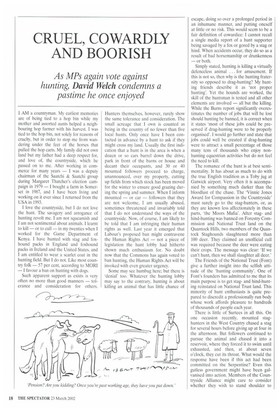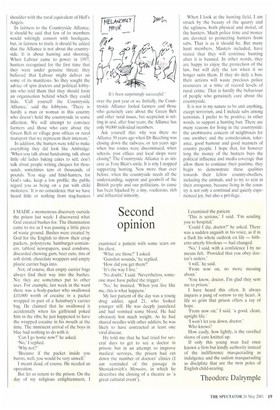CRUEL, COWARDLY AND BOORISH
As MPs again vote against
hunting, David Welch condemns a
pastime he once enjoyed
I AM a countryman. My earliest memories are of being tied to a hop bin while my mother and assorted aunts helped a neighbouring hop farmer with his harvest. I was tied to the hop bin, not solely for reasons of cruelty, but in order to stop me from wandering under the feet of the horses that pulled the hop carts. My family did not own land but my father had a deep respect for, and love of, the countryside, which he passed on to me. After working in commerce for many years — I was a deputy chairman of the Saatchi & Saatchi group during Margaret Thatcher's election campaign in 1979 — I bought a farm in Somerset in 1987, and I have been living and working on it ever since I returned from the USA in 1993.
I love the countryside, but I do not love the hunt. The savagery and arrogance of hunting revolt me. I am not squeamish and I am not sentimental about animals. I learnt to kill — or to cull — in my twenties when I worked for the Game Department of Kenya. I have hunted with stag and foxhound packs in England and foxhound packs in Ireland and the United States, and I am entitled to wear a scarlet coat in the hunting field But I do not. Like most country folk — 57 per cent, according to MORI — I favour a ban on hunting with dogs.
Such apparent support as exists is very often no more than good manners — tolerance and consideration for others. Hunters themselves, however, rarely show the same tolerance and consideration. The small acreage that I own is counted as being in the country of no fewer than five local hunts. Only once have I been contacted in advance by a hunt to ask if they might cross my land. Usually the first indication that a hunt is in the area is when a dozen or so cars barrel down the drive, park in front of the barns or house and decant their occupants, and 30 or 40 mounted followers proceed to charge, unannounced, over my property, cutting up fields from which stock has been moved for the winter to ensure good grazing during the spring and summer. When I inform mounted — or car — followers that they are not welcome, I am usually abused, sometimes threatened and invariably told that I do not understand the ways of the countryside. Now, of course, I am likely to be told that I am infringing their human rights as well, Last year it emerged that Labour's proposed ban might contravene the Human Rights Act — not a piece of legislation the hunt lobby had hitherto shown much enthusiasm for. No doubt now that the Commons has again voted to ban hunting, the Human Rights Act will be invoked with even greater urgency.
Some may see humbug here; but there is 'denial' too. Whatever the hunting lobby may say to the contrary, hunting is about killing an animal that has little chance of escape, doing so over a prolonged period in an inhumane manner, and putting oneself at little or no risk. This would seem to be a fair definition of cowardice: I cannot recall a single media report of a hunt supporter being savaged by a fox or gored by a stag or hind. When accidents occur, they do so as a result of bad horsemanship or drunkenness — or both.
Simply stated, hunting is killing a virtually defenceless animal . . for amusement. If this is not so, then why is the hunting fraternity so opposed to drag-hunting? My hunting friends describe it as 'not proper hunting'. Yet the hounds are worked, the skill of the huntsman is tested and all other elements are involved — all but the killing. While the Burns report significantly overestimates the number of jobs that will be lost should hunting be banned, it is correct when it states 'most of these jobs could be preserved if drag-hunting were to be properly organised'. I would go further and state that jobs could well be created if drag-hunting were to attract a small percentage of those many tens of thousands who enjoy nonhunting equestrian activities but do not feel the need to kill.
The romance of the hunt is at best sentimentality. It has about as much to do with the true English tradition as a Toby jug at Gatwick airport. Very often it is accompanied by something much darker than the bloodlust of the chase. The `Vinnie Jones Award for Compassion in the Countryside' must surely go to the stag-hunters, or, as they are known less affectionately in these parts, 'the Moors Mafia'. After stagand hind-hunting was banned on Forestry Commission and National Trust land on the Quantock Hills, two members of the Quantock Staghounds slaughtered more than 100 deer. They claimed an unofficial cull was required because the deer were eating their crops. The message was clear: 'If we can't hunt, then we shall slaughter all deer.'
The Friends of the National Trust (Font) give a further insight into the selfish attitude of the 'hunting community'. One of Font's founders has admitted to me that its main purpose is to get stagand hind-hunting reinstated on National Trust land. This minority of hunt enthusiasts is quite prepared to discredit a professionally run body whose work affords pleasure to hundreds of thousands of people each year.
There is little of Surtees in all this. On one occasion recently, mounted staghunters in the West Country chased a stag for several hours before giving up at four in the afternoon. But followers continued to pursue the animal and chased it into a reservoir, where they forced it to swim until exhausted, and then, at about seven o'clock, they cut its throat. What would the response have been if this act had been committed on the Serpentine? Even this gutless government might have been galvanised into action. Members of the Countryside Alliance might care to consider whether they wish to stand shoulder to shoulder with the rural equivalent of Hell's Angels.
In fairness to the Countryside Alliance, it should be said that few of its members would wittingly consort with hooligans, but, in fairness to truth, it should be added that the Alliance is not about the countryside. It is about hunting and shooting. When Labour came to power in 1997, hunters recognised for the first time that they were under genuine threat; they believed that Labour might deliver on some of its manifesto, So they sought the advice of spin doctors and political lobbyists who told them that they should form an organisation behind which they could hide. 'Call yourself the Countryside Alliance,' said the lobbyists. 'There is hardly a man or woman in this country who doesn't hold the countryside in some affection. We will attempt to convince farmers and those who care about the Green Belt or village post offices or rural transport that we represent their interests.'
In addition, the hunters were told to make everything they did look like Ambridge: 'When you talk about fundraising, talk about little old ladies baking cakes to sell; don't talk about people writing cheques for thousands, sometimes tens of thousands, of pounds. You stagand hind-hunters, for God's sake, keep a low profile; the public regard you as being on a par with child molesters.' It is no coincidence that we have heard little or nothing from stag-hunters it's been surprisingly successful.'
over the past year or so. Initially, the Countryside Alliance fooled farmers and those who genuinely care about the Green Belt and other rural issues, but scepticism is setting in and, after four years, the Alliance has only 90,000 individual members.
Ask yourself this: why was there no Alliance 50 years ago when Dr Beeching was closing down the railways, or ten years ago when bus routes were discontinued, when schools, post offices and local shops were closing? The Countryside Alliance is as sincere as Tony Blair's smile. It is why I stopped supporting hunting. Now more than ever before, when the countryside needs all the understanding, support and goodwill of the British people and our politicians, its cause has been hijacked by a tiny, vociferous, rich and influential minority. When I look at the hunting field, I am struck by the beauty of the quarry and the ugliness, both physical and moral, of the hunters. Much police time and money are devoted to protecting hunters from sabs. That is as it should be. But many hunt members, Masters included, have stated that they will continue hunting after it is banned. In other words, they are happy to enjoy the protection of the law, but will defy the law when it no longer suits them, If they do defy a ban, their actions will waste precious police resources at a time of record levels of rural crime. That is hardly the behaviour of people who genuinely care about the countryside.
It is not in my nature to be anti anything, except terrorism, and I include sabs among terrorists. I prefer to be positive; in other words, to support a hunting ban. There are many reasons for living in the countryside: the unobtrusive concern of neighbours for one another; and the consideration, tolerance, good humour and good manners of country people. I hope that, for however long the money of the hunters buys the political influence and media coverage that allow them to continue their pastime, they begin to demonstrate these qualities towards their fellow country-dwellers, including the animals, and to try to rein in their arrogance, because living in the country is not only a continual and quietly experienced joy, but also a privilege.



















































































 Previous page
Previous page